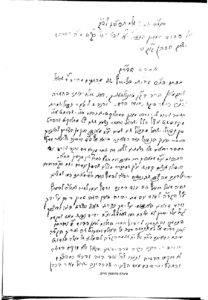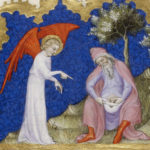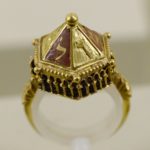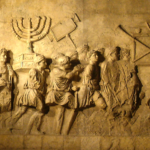The Haftoroh-or reading from the Prophets after the Torah reading for the first day of Rosh Ha-Shanah, gave me some inspiration for the Ten Days of Repentance leading up to Yom Kippur, which Rosh Ha-Shanah begins.
The Haftoroh comes from the First Book of Samuel and relates the story of Samuel’s birth. His mother, Chanah, had been barren for several years. Desperate, she journeys to the Tabernacle at Shiloh to pray for a child. She prays fervently and silently-uncommon at that time, according to Artscroll’s Stone Chumash [Pentateuch]. Eli the Kohen Godol [High Priest], off-put by this strange, physically agitated woman, mouthing words without sound, scolds her for entering the Tabernacle drunk.
Why did Eli assume Chanah was intoxicated?
The Kohen Godol had a way of soliciting answers to questions they posed to G-d through a device called the Urim and Tumim. On the Kohen Godol’s breastplate were twelve gemstones with the name of a tribe of Israel etched on each one. When the Kohen Godol asked a question of G-d, certain letters in the tribes’ names lit up, comprising the answer. However, the letters of the answer did not always light up in order; it was up to the Kohen Godol to decipher the results. Eli asked who Chana was. In response, the letters shin-kaf-reysh-hey lit up, spelling shikroh: “drunk.” Eli acted accordingly. But the actual answer was kaf-shin-reysh-hey, spelling kasheroh: “proper.”
We thus see that Eli was not as in tune with Ha-Shem as a Kohen Godol should be. The Haftoroh supports this conclusion by noting that Eli’s sons extorted bribes from the people to offer their sacrifices, which only a Kohen can do, and fornicated with what seems to be a collection of Tabernacle groupies. Eli knew of his sons’ sin and rebuked the for it-but did not take any action to stop them. Since Eli did not go as far as he should have for Ha-Shem, he did not get as close as he could have to ha-Shem.
Chofetz Chaim
This lesson in turn reminds me of a story I heard from Rabbi Gershon Gewirtz of Young Israel of Brookline, Massachusetts. It’s about the Chofetz Chaim, a great rabbi of the early 20th Century in Poland. His hometown of Radin needed someone in charge of the tzedokoh, or charity, fund, and the Chofetz Chaim asked one of his students to take the position. The student replied, “I’m honored, but really I’d rather not. It would take too much time from my Torah study.”

The Chofetz Chaim then told him about two sages of the Talmud, Rabbi Rava, and Rabbi Abaye. Both were descended from Eli the Kohen Godol. Because of his laxity and his sons’ greed, all of Eli’s descendants were cursed to die at a relatively young age. Rabbi Rava, who was known for his Torah learning, died in accord with the curse at the age of 40. Rabbi Abaye was known not only for his Torah learning but also for his acts of kindness, and lived to the age of 60; the merit of his good deeds allowed him to break the curse. The Chofetz Chaim concluded: “So, if you take this job, you’ll have a lot more time to study Torah.”
As we can see from these stories, a partial devotion to G-d does not suffice. We must serve G-d not only ritually but ethically, not only intellectually but actively. As we resolve and plan on living better lives in the new year, integrating the various ways in which can follow the commandments is the greatest way to receive atonement from, and attain at-one-ment with, Ha-Shem.






